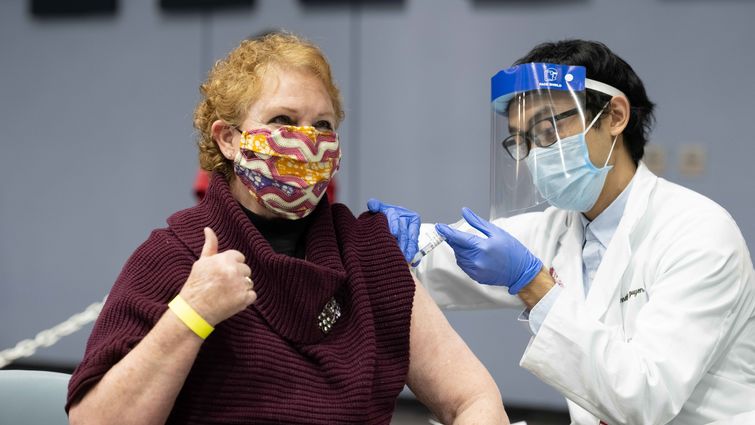
Patient receives COVID booster shot while giving a thumbs up
Though the newest variant of COVID-19 is still being researched, infectious disease expert Anna Ursales, MD, shares how the booster can protect ourselves and others.
What do we know about Omicron?
Omicron was first spotted in the United States Nov. 29. A spike of COVID-19 cases in Southern Africa influenced researchers to study genetic sequencing. That’s when they found the new cases were indeed different than the two variants commonly known.
Omicron has about 50 mutations from the original SARS-CoV-2 but it’s too early to tell if it’s more severe or more contagious. Delta has shown more severe symptoms than the prior variants due to the behavior of its spike proteins, and is about twice as contagious, making it the most common variant in the U.S.
How can I prevent myself and loved ones from getting sick?
The Centers for Disease Control and Prevention (CDC) is encouraging everyone 18 and older to get the booster upon waiting six months from receiving the first two doses of Pfizer and Moderna, and two months after Johnson and Johnson’s single dose. The three vaccines can be mix-and-matched, allowing for higher dissemination.
CDC data suggest that the effectiveness of vaccinations decreases over time, especially in those 65 and older, which experts say increases the importance of getting a booster shot.
Current vaccines and boosters are not targeted toward Delta or Omicron, but Ursales said the boosters do provide extra protection, more so than the previous two shots. “The booster could potentially prime our immune system to be able to fight more effectively against these variants,” Ursales said.
Just as each individual experienced unique reactions to the initial vaccines, you can expect to see different side effects from the people around you.
Next steps: Vaccinating the unvaccinated
Some regions have limited access to the vaccine and booster, leading these areas to prioritize vaccinations to those who have not received any doses. Ursales explained this is essential to decrease the spread and see fewer severe cases.
She emphasized that unvaccinated patients have experienced, on the whole, more serious symptoms than vaccinated individuals who are largely experiencing mild symptoms from Delta.
“The unvaccinated individuals do have a higher risk of incurring the infection and also more severe symptoms, hospitalizations, and even death,” Ursales said.
Ursales highly encourages people to continue practicing preventive measures such as wearing masks, washing your hands, and physical distancing. If you have been exposed to COVID-19, home-based tests are a great screening measure — but if clear symptoms are present, you may need to use another testing modality, such as the PCR test.
For more information about COVID-19 vaccines and testing at Loma Linda University Health, visit lluh.org/coronavirus.
